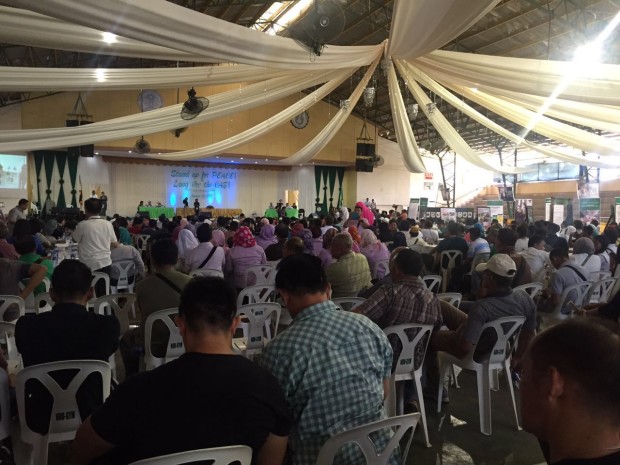PERSPECTIVE: Next admin key to fate of peace process
COTABATO CITY, Philippines — In 2014, the streets of this city were lined with green banners, to celebrate the signing of a comprehensive peace agreement between the government and the Moro Islamic Liberation Front.
Last week, the same streets were filled with campaign posters and candidate tarps. It’s election season once again — but there is no campaign to ratify the Bangsamoro Basic Law (BBL) in a plebiscite. Because there is no BBL.
It will be up to the next president of the Philippines to continue the peace process and achieve lasting peace in the conflict-ridden areas of Mindanao.
The Comprehensive Agreement on the Bangsamoro (CAB) was signed to local acclaim and international praise on March 27, 2014. Two years, one bloody encounter and one stalled law later, members of the MILF and supporters of the peace process say they are deeply frustrated.
READ: What is the Comprehensive Agreement on the Bangsamoro?
Article continues after this advertisement“There is frustration. There is widespread frustration on the ground. And that is expected,” MILF peace negotiating panel chair Mohagher Iqbal told reporters before the sombre CAB commemoration event in Notre Dame University, Cotabato City last Monday, March 28.
Article continues after this advertisement“Seventeen long years of negotiation. We expect[ed] the BBL to pass Congress. It did not pass. So you can imagine, we are human beings, [it frustrated] especially those people involved in the negotiation.”
READ: MILF admits frustration amid Bangsamoro agreement’s 2nd anniv
The tragedy in Mamasapano, Maguindano, where more than 60 people died, including 44 members of the Philippine National Police’s Special Action Force, delayed the hearings on the landmark BBL and increased the number of lawmakers opposed to it. In the end, the proposed law became a casualty of the Mamasapano incident.
READ: The casualty: BBL
Almost palpable
The second anniversary of the CAB signing was supposed to be a celebration, but disappointment at Congress’ failure to pass the BBL was almost palpable.
In their respective speeches, both Iqbal and government peace panel chair Miriam Coronel-Ferrer made mention of the stalled BBL.
“We are all agreed that without the BBL, the CAB will never be fully implemented,” Iqbal said. “Without the BBL, the CAB can never become the solution to the Bangsamoro Problem or Question.”
“I disagree with those who are saying we have nothing to celebrate because we did not get the BBL,” Coronel-Ferrer said. Countless lives have been saved because of the ceasefire resulting from the peace talks, she said.
From 1970 to 1996, an estimated 120,000 people died in the so-called Mindanao conflict. Excepting the Mamasapano incident, the ceasefire between government forces and the MILF has held in the last four years.
The Moro insurgency also kept the affected regions impoverished, with more than half of the population living in poverty, according to government data. Many do not have access to services and public utilities.
READ: Failure to pass BBL not a reason to stop Bangsamoro agreement celebration
Iqbal said the MILF will not abandon the peace process. “We are more determined to assert the full, unconditional implementation of the CAB, especially the enactment of the BBL,” he said.
“Let us make more friends. Let us not make our friends our enemies,” Coronel-Ferrer said, telling reporters it was fortunate that the MILF has continued to set its eyes on pursuing peace.
“Many of us shed tears when the CAB was signed, something hardened warriors never do in public and rarely in private. But the CAB is the summation of all our aspirations and emotions,” Iqbal said. “Now that our legitimate grievances and aspirations have already been recognized and affirmed not only by the Government of the Philippines but by the nations of the world, do we have to stop in our struggle just because the moment is not favorable to us?”
READ: Only 3 options for MILF after BBL non-passage, says Iqbal
Next administration
President Aquino jump-started the then-stalled peace talks when he met MILF chair Murad Ebrahim in Japan in 2011, a show of good will which continues to encourage the MILF negotiators to this day. It is uncertain, however, whether the next president would share his views.
Of the five presidential candidates, three have been vocal about their misgivings over the BBL.
The three senators running for Malacanang — Miriam Defensor-Santiago, Ferdinand Marcos Jr., and Grace Poe — have all spoken against the proposed law.
Poe, who headed a Senate committee that investigated the Mamasapano incident, said she opposed the Malacañang-sponsored BBL because it would create a separate republic.
The BBL implements the provisions of the CAB by creating a Bangsamoro political entity to effectively replace the current Autonomous Region in Muslim Mindanao (ARMM).
READ: Poe, Escudero say they’re against BBL, lifting of limits
Poe has also insisted on an “inclusive peace negotiation”—meaning, not just with the MILF.
Marcos, who heads the committee deliberating on the proposed law, also has misgivings about the administration’s version of the BBL.
He submitted his own version, which he described also as “inclusive.” He argued against rushing the hearings on the proposed measure, saying the BBL was “not a magic pill to stop the war in Mindanao.”
READ: Marcos says his BBL version is more inclusive | Marcos: Rushing BBL passage ‘could be a fatal waste’
President Aquino blames Marcos for the delay in the passing of the BBL.
“The BBL was stalled in the Senate committee on local government, chaired by Senator Marcos. And in the last days of session, Senator Juan Ponce Enrile continued to interpellate against it,” the President said last month. “Aren’t these two surnames the ones who pushed for the military solution against Moros during the dictatorship?”
READ: Aquino slams Marcos son, says martial law not PH’s ‘golden age’
Santiago has repeatedly questioned the constitutionality of the BBL and the agreement itself.
She claimed that the executive department did not have the power to negotiate such an agreement and that the deal involves the creation of a sub-state, in violation of the Constitution.
Not as vocal
Former interior secretary Manuel “Mar” Roxas II, who has vowed to continue Aquino’s “Daang Matuwid” (Straight Path) reform agenda, has not been as vocal about the BBL but he has promised to push for its passage if he becomes president. Earlier, he urged groups to support the measure.
READ: Mar Roxas says BBL is Mindanao’s ‘last chance’ for peace
Iqbal said only Davao City Mayor Rodrigo Duterte has approached the MILF and expressed his support for the BBL.
“He said: ‘If I will be the president of the Philippines, I will push the BBL in Congress.’” Duterte reportedly admitted that the federalism program he advocates can take years to implement.
Duterte, as a candidate from Mindanao, has been getting a lot of support from the island.
“I have been proposing federalism. But your territory will not be touched. It will be our collective position,” Duterte was quoted as saying during his visit to the MILF headquarters.
READ: Federalism is key, Duterte tells MILF
Coronel-Ferrer acknowledged the obvious: It will be difficult to have a comprehensive discussion on the peace issue during the campaign period.
“Kaya nga sana ang kagustuhan natin ipasa natin ang isang magandang sitwasyon dito sa usaping Bangsamoro sa susunod na administrasyon para hindi na rin mahirapan, makita ang kahalagahan nito, mga nakamit at ipagpatuloy,” she said.
(That is why we wanted to pass the BBL so the next administration would face a better situation. It won’t be that difficult for them and it will be easier for them to understand its importance and what the peace process has achieved.)
The next administration will “have no choice” but to continue the peace process, she said. It is the obligation of the next administration to complete the process and maintain peace in Mindanao, she added.
But in a political setting that revolves around the central office of the presidency, the fate of the peace process in Mindanao will likely depend on who the next president will be.

